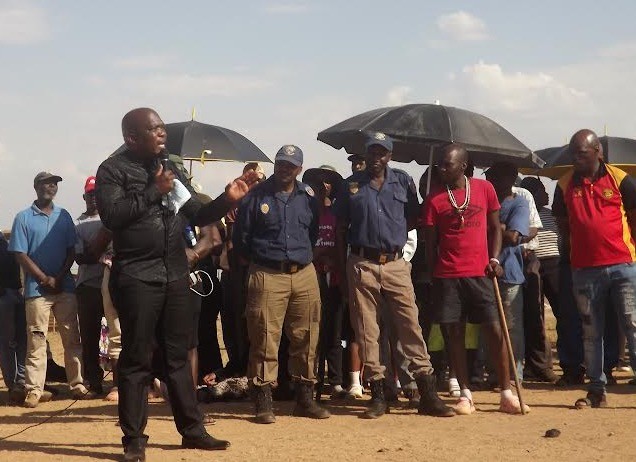
28 October 2024
Councillor Ganadhla Mabona addresses residents of Ebhubesini informal setttlement during a fiery meeting on 8 October. Photos: Warren Mabona
Families in Ebhubesini informal settlement, near Bronkhorstspruit in the east of Pretoria, are caught in the crossfire in a fight for power between the ward councillor and the man who says he founded the settlement.
Tensions flared at a meeting in Ebhubesini on 8 October, when ward councillor Ganadhla Mabona accused Mduduzi Mhlanga of blocking progress formalising the settlement.
Ebhubesini is along the R568 Road near Bronkhorstspruit in the east of Tshwane. Residents say it was set up by Mhlanga, who started “allocating stands” to families in 2017.
Residents say they have been hoping for basic services for years.
Addressing about 500 residents on a sports field on 8 October, Mabona pleaded for patience. He said formalisation of any area takes time.
Mabona said Mhlanga had blocked a team of land surveyors sent by the Gauteng Department of Human Settlements on 26 September to survey the area as part of the process of formalisation.
“The surveyors came here to survey Ebhubesini, but the owner of Ebhubesini blocked them by ordering them to leave this area,” said Mabona.
“Let us not be deceived by people because they are scared that if the government intervenes, this thing of selling people’s stands three times or four times will come to an end.” He said he had received threatening phone calls.
“The man who blocked surveyors is Mduduzi Mhlanga. If he is here, let him come forward and explain what it is that made him block the development of Ebhubesini.”
Later during the meeting, Mhlanga emerged from the crowd and walked towards Mabona, but Mabona refused to give him a chance to speak. He said this was because he had afforded Mhlanga an opportunity on 27 September to come and talk to him, but Mhlanga had refused.
Speaking to GroundUp after the meeting, Mhlanga acknowledged that he had blocked the surveyors. He said this was because Mabona and the City of Tshwane had refused to enter into a written agreement with him undertaking not to demolish residents’ houses or reduce the size of their stands during the formalisation process.
“It’s true. I blocked the surveyors,” said Mhlanga. “The reason I blocked the surveyors is that I told the surveyors that I know how [the City of] Tshwane works. They will survey and tell the engineer that the houses of people are in the way of roads and pipes. They will demolish these houses and no one will refund these people. I wanted to protect people from losing the last monies that they used to build houses.”
But, he said, he would no longer block surveyors, because many residents had indicated during the meeting that they wanted the surveyors to come.
Mhlanga told GroundUp he had “founded” the area in 2017 at the request of a group of elderly women from Ekangala. He said he had occupied empty farm land and allocated stands to people for free. Any company or person who wanted to run any developmental projects in Ebhubesini must first consult him and his committee, he said.
“They must know that there is a community’s committee that started Ebhubesini. [Whether] they like it or not, they must come to us,” said Mhlanga.
He said the stands he “allocated” were sold to the residents for R50 each by a “local traditional leader” who worked with him. He said he did not remember the name of the leader. He said there were 7,000 households in the settlement.
Mduduzi Mhlanga (far right) with members of his committee and supporters.
Several residents told GroundUp after the meeting that they support Mhlanga as they fear that the City will demolish their houses or reduce their stands when developing the area.
“Mhlanga is our leader and he is protecting us from losing our houses,” said resident Muzi Mkhwanazi.
Speaking to GroundUp on the phone on 14 October, Mabona said he was living in fear of his life because Mhlanga had assaulted him in his office last year and threatened him. Mhlanga denied this.
Mabona said there were between 2,000 and 3,000 homes in the settlement, not 7,000. Ebhubesini had never had a traditional leader, he said.
Bongi Jiyana, who lives in a shack with her husband and their three children, said Mhlanga had “given them a stand” in 2022. She said the City sends trucks with drinking water but not often enough.
“We don’t have a water tank in our yard and the truck comes only once a week,” said Jiyana. “I always struggle to cook and wash clothes for us because we don’t get enough water from the trucks.”
Asked about water supplies, Mabona said the City sends trucks to deliver water to the residents every day, but did not say how many trucks.
GroundUp sent a list of ten questions to the City but spokesperson Lindela Mashigo did not answer all the questions. Mashigo said the City is in the process of formalising Ebhubesini.
“There are consultants already appointed through the City’s Human Settlement Department to see the process through,” said Mashigo.
“Currently, the City is providing the settlement with mobile toilets and water through Jojo tanks which are filled by water trucks.”
The settlement has no running water or sanitation.